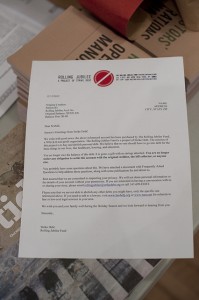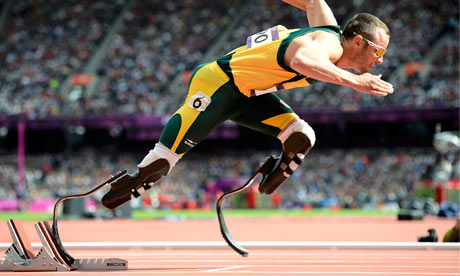The Rolling Jubilee has rolled out its first debt abolition. Letters to over forty (former) debtors have been mailed out in specially designed care packages. The point here is that if you are in debt, you’re used to getting letters of all kinds, carefully designed to get you to open them, that are about repayment. So these shiny gifts want to send the message that they contain something very different.
Here’s what people will read:
We write with good news: the above referenced account has been purchased by the Rolling Jubilee Fund, a 501(c)(4) non-profit organization. The Rolling Jubilee Fund is a project of Strike Debt. The mission of this project is to buy and abolish personal debt. We believe that no one should have to go into debt for the basic things in our lives, like healthcare, housing, and education.
You no longer owe the balance of this debt. It is gone, a gift with no strings attached. You are no longer any obligation to settle this account with the original creditor, the bill collector, or anyone else.
The Rolling Jubilee debt-buying team has taken incredible care with all the mechanics of this process. The team itself includes accountants and lawyers. They’ve been meeting with legal advisors since the summer to get this right.
Today the legal team also went public, via an interview with Nick Pinto of the Village Voice. Sadly, this was necessary because certain economics commentators on the institutional left took it upon themselves to claim that Strike Debt was going to get the debtors into tax trouble. The assertion was the IRS would see the debt forgiveness as income. Strike Debt is clear that it’s a gift and not subject to tax.
The tax lawyer dismisses the concern that the Rolling Jubilee is engaged in commercial activity: “It doesn’t make a great deal of sense to me,” she said. “When Habitat for Humanity is helping people build houses, someone still has to buy the lumber. It doesn’t change their tax status. The critical thing is that this is a not-for-profit organization, and it’s not engaged in trying to make money.”
The fact is that as of now, there’s $100,000 less medical debt out there. That has to be a good thing. We know it’s a drop in the ocean but that’s not the point. The Jubilee is a hack, or very precisely, a détournement. This latter was the way the Situationist International used the system against itself, which is exactly what the Rolling Jubilee has done.
It’s inspired activists in the UK to set up their own organization, Strike Debt UK. Writing in the new issue of the Occupied Times, the activists ask:
Can we, for example, buy discounted debt on the secondary debt market? Do we want to do this? What is the procedure? What are the relevant laws in England and Wales? Do we need a Debt Resistors’ Operations Manual here? Many of the questions raised in the group highlighted the need for people to come together, do the research, and share their findings in an accessible way. It also became very apparent that debt is becoming a popular tool in the resistance of capitalism, and as defaulting becomes more commonplace, we need to establish processes which will protect people, rather than financial institutions.
These are the right questions to ask. It would be nice if our friends on the established left felt like helping out. But we’ve been doing fine by ourselves so far. The next step is coming. Watch Barcelona in January, New York in February, maybe London in March. We are rolling.





